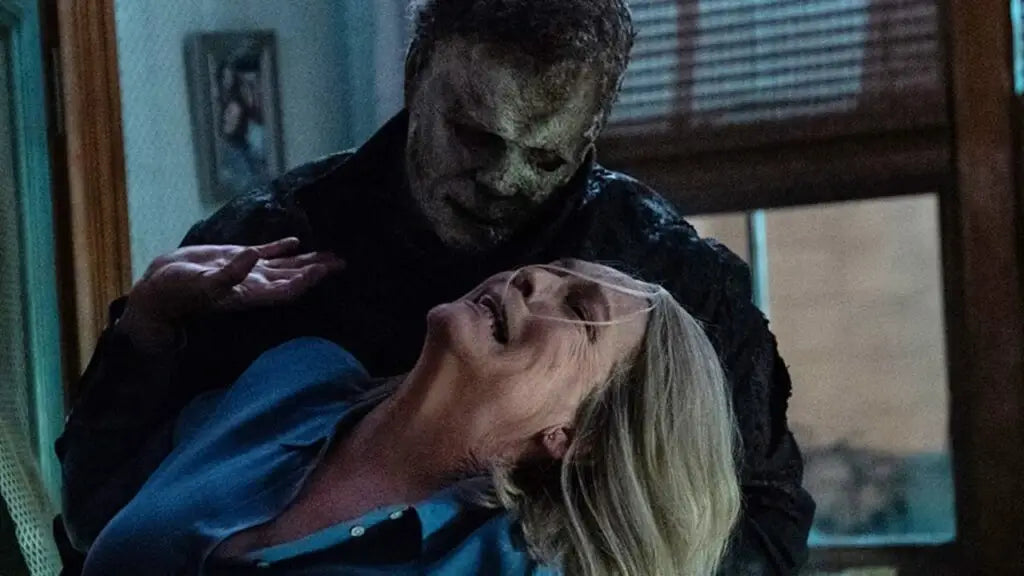It has been forty years and yet Michael Myers is a character, a kinda-sorta metaphor, a man, a monster, and an image that has persisted in popular culture for so long without ever having needed to say a word. The silent and very, very deadly masked killer has been hacking and slashing his way through what is now thirteen movies over the years; no doubt a testament to the weird, macabre power that Myers has held over audiences as one of the slasher genre’s original villains.
But has the most successful killer in horror history finally met his match against pure franchise fatigue? John Carpenter’s 1978 original is as simple as it gets: a masked murderer goes about killing folks in an unsuspecting town. It’s tight, tense and to the point, and it inadvertently established the basic slasher formula that everyone knows today. Pretty much all but one of the thirteen films in the Halloween franchise (Season of the Witch being the outlier here in a good way) have followed that same setup. Myers kills people, some run away, some fight back, he always survives to rinse and repeat in the next movie. It’s been done ad nauseum not just in this franchise but several, not to mention an endless array of standalone copycat movies. You have to be particularly innovative to make a real splash in the slasher space in this day and age.
So despite the attempts at larger thematic ideas in this recent trio of legacy sequels from director David Gordon Green, things have still felt painfully rooted in more of the same. A legacy sequel dealing with Laurie Strode’s trauma was already done back in ‘98, and while Green’s films take a more serious approach than H20 did, by this third film in his trilogy that starts to become somewhat of a detriment. Perhaps it’s just been stretched out too long and the trilogy’s ideas would’ve been better off condensed into a single or, to be generous, a pair of films rather than three.

Courtesy of Universal
2018’s Halloween gave the franchise a modern polish and had smart sensibilities towards its concepts of violence and grief. But most importantly, it made Myers’ and Laurie’s return an exciting event all its own, with several moments worth cheering for. Dragging this rematch on through Halloween Kills and now into Halloween Ends, which jumps ahead a few years after the events of the first two, has made everything feel just as monotonous as before. At least Rob Zombie could always make the demanded violence of his Halloween movies consistently and viscerally upsetting. By the time Myers stabs someone to death for the hundredth time in Halloween Ends, it feels obligatory more than anything. Even the big guy himself doesn’t seem very into it anymore.
That’s not to say that there’s no merit there; Green’s trilogy is grappling with ideas of how destructive unchecked trauma can be, as well the very nature of evil itself, which harkens back to what Carpenter’s original sought to manifest. When we pick back up with Laurie (Jamie Lee Curtis) in this finale, she has lost everyone in her life to her decades-long struggle against Myers (James Jude Courtney). Her family, her friends, her neighbors, and her community have all suffered greatly. Only her granddaughter Allyson (Andi Matichak) remains with her, but the relationship is strained - Laurie is understandably overprotective while Allyson can’t help but hold a bit of resentment following the murders of both of her parents. Both can’t quite figure out what to do with each other and it makes for solid character drama.
I appreciate that Green uses the time allotted to give fans what they wanted and expected in the first film and then pulls the rug out from under them in the grim middle chapter. It leaves the surviving characters in an interesting place and serves as a harsh truth regarding how trauma and darkness can never really be vanquished; how it sometimes comes back in even worse ways than before, spreading and growing indefinitely. Halloween Ends captures that bleak atmosphere better than the previous two entries and is able to give its themes a stronger standing than those films as well. The cycle of fear, hate and violence repeating and repeating is kind of the whole point of what Green is getting at.

Courtesy of Universal
But the franchise still feels trapped in the confines of its own making. It’s hard to reconcile these more mature and metaphorical concepts when the film is still predominantly made up of some big dude in a mask killing a bunch of morons for the millionth time. And for all of its narrative swings, of which there are a couple of surprises to be found, it still ends pretty much exactly how you’d expect it to. I suppose it couldn’t end any other way, but why can’t Myers just come back yet again after this like he always has? Who knows? He undoubtedly will eventually (the stockholders demand it) so here’s hoping that when he does, we can at least have some dumb fun with it and send him up to space or something.
Halloween Ends has a lot on its mind for the thirteenth entry in a decades-old slasher franchise. But outside of an attention-grabbing opening scene, sharp callbacks to the original, and a couple moments of inspired brutality, it’s the franchise itself that holds the film back. Much of these same ideas have been tackled in far richer horror movies, ones that aren’t shackled by the built-in quotas of a well-established IP. This may serve as a satisfying enough conclusion for many fans, but for me, it stands as a prominent example of a series that got it far too right the first time.
'Halloween Ends' is now playing in theaters and streaming on Peacock.




